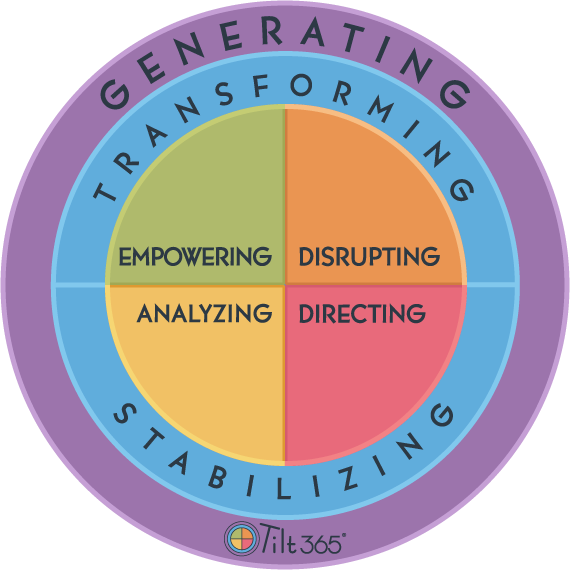Grow an agile personality by developing your character strengths.
Personality is not a set type people change all the time. And it is your character strengths that determine your personal and professional outcomes.
Uncover your personality preferences, dominant character strengths, and areas for improvement to become more agile in life and work.
Learn how you can Tilt four patterns of behavior that are proven to amplify creativity and innovation at work.
True Tilt Personality Profile™
Quickly discover your natural character strengths and understand what is driving them.
Unique Amplifier™
Crack the code to the energizers and social preferences that amplify your personal brand.
Agility Growth Tracker™
Track your development of balance over time and identify early warning signs that can derail relationships.
Why Tilt?
Personality is not static
You are not at the mercy of your innate traits or contexts.
Rewire your identity
Don’t just react to external chaos, instead strengthen yourself from the inside out.
Discover your true self
Who you are right now is the driver of your current results, so answer honestly.

Transform your mindset
Self-assessments and tools to help you stop thinking from a place of fear and scarcity and transform your mind to abundance and generativity.
Who's Tilting




.png?width=1200&length=1200&name=zendesk-removebg-preview%20(1).png)




.png?width=1200&length=1200&name=zendesk-removebg-preview%20(1).png)




.png?width=1200&length=1200&name=zendesk-removebg-preview%20(1).png)




.png?width=1200&length=1200&name=zendesk-removebg-preview%20(1).png)




.png?width=1200&length=1200&name=zendesk-removebg-preview%20(1).png)
What people are saying
There’s nothing like the current moment to get started changing your life and career outcomes.
“Personality is where we begin, but it’s our character that truly shapes our destiny.”
-Pam Boney






It has accurate assessments that include both good and bad character traits without shaming or elevating one personality type over another, but rather by showing how we can all learn to be better versions of ourselves through our personalities as opposed to in spite of them.
Over the years I have used a number of assessments but my favorite, by far, is the suite of assessments by Tilt 365. Backed by research, steeped in positive psychology, with a premise of agility and balance, their models and philosophical underpinnings create so much more than a “personality assessment.” I highly encourage you to explore their models. I just purchased assessments for my new leaders this week, including their 360° for myself. The reports are thorough and easy to read, with actionable insights. I literally cannot say enough about them.
The TILT365 framework and assessments combined with coaching are truly enlightening and unlike anything I had done before. Tilt’s methods helped me remove blockers that I didn’t even realize that I had, and they were truly hindering my growth and causing me so much unneeded stress. The insights I gained were transformational for me and not only helped me be a better leader but a stronger person. I wish I had met her earlier in my career, but so glad to know her now.
It was so accurate it's scary! It was broken down so comprehensively and I absolutely love the detail it went into in each section. I learned some new things about myself and solidified what I already knew about myself. Everyone who wants to make a difference in their work-life needs to do this test. I dare say it has changed my life and approach to work.
It was extremely eye-opening and am still reeling from the revelations.Such a simple evaluation that provides such a detailed, spot on summary of me.
The report was brilliant. I totally recognised myself in the description of my personality so it was easy to be open to the suggestions. The supporting literature also made the whole concept easy to understand and digest.
Have already recommended it to 4 colleagues. I'm a retired psychologist, but the profile described actionable insights of how to cope with some of my weaknesses that I had not thought of in that light. Sections about working with people of different profiles were also useful.
I just love seeing how much my profile matched my personality and how I can try to tilt towards my weaknesses to be a more rounded self. Also, I like seeing what tilts other people have and how I can better work with them given the information.
It has accurate assessments that include both good and bad character traits without shaming or elevating one personality type over another, but rather by showing how we can all learn to be better versions of ourselves through our personalities as opposed to in spite of them.
Over the years I have used a number of assessments but my favorite, by far, is the suite of assessments by Tilt 365. Backed by research, steeped in positive psychology, with a premise of agility and balance, their models and philosophical underpinnings create so much more than a “personality assessment.” I highly encourage you to explore their models. I just purchased assessments for my new leaders this week, including their 360° for myself. The reports are thorough and easy to read, with actionable insights. I literally cannot say enough about them.
FAQ
What is personality?
Personality is a combination of inherited traits and character traits that combine as an overall pattern for how you behave with others socially. As such, your personality pattern is essentially a strategy for how you interact with others and the world around you. Many personality traits are innate but other character traits are developed in your formative years, resulting in mental attitudes regarding how you see the world. These attitudes predict how you are likely to feel, think and interact for the rest of your life unless you evolve from life-changing experiences or choose intentional change.
Can personality change?
In 1890, William James first published “The Principles of Psychology,” which claimed personalities do not change, which led to nearly a century of personality profiling. In 2003, the American Psychological Association noted the changing consensus in the field that personality does change over time. Current research in the field of neuroscience has proven the plasticity of the brain throughout our entire life. This means we can purposely choose to develop our personality patterns that are disruptive and unhealthy.
Why is it important to change personality?
From a leadership & development perspective, approaching individuals’ personalities as unchangeable undermines the whole notion of coaching and personal development which calls for growth toward a state of agility which has become essential in a networked global society.
How can I change my personality?
Your trait patterns are largely established in the first decade of life, but you can improve these patterns by choosing to develop what is called character strengths. Based in positive psychology and character science, the idea is that you choose to intentionally develop traits and strengths that are deemed timelessly positive by society. In this way, you can generate better outcomes for yourself in life and work by making the most of your social value.
What is a personality assessment?
A personality assessment is a survey that measures an individual's preferred attitudes, beliefs and character traits. It is designed to provide insights into an individual's unique pattern of individual traits, attitudes and mental assumptions that can predict behavior. For example, an attitude that “most people have good intentions” would predict behaviors of trust in that person’s relationship strategy.
Why are personality assessments important?
Personality assessments help people better understand who they are, their natural preferences, and areas that they might need to develop. Having a personality assessment framework also helps you better understand other people, recognizing quicker, where you are similar and different from each other.
How can Tilt365 assessments help my personal development?
Tilt’s strengths-based assessments increase self-knowledge and self-awareness regarding natural behavioral patterns and possible over- or underused traits or strengths acquired over time, allowing you to make more conscious choices regarding how you want to interact in more positive ways. Tilt’s assessments don’t just put you in the box of a “type” which can create self-limiting beliefs, but can also show you how you can grow agility in order to tap into all the resources you have.
What is the True Tilt Personality Profile™?
The True Tile Personality Profile™ is a personality assessment based on neuroscience and character science. It provides deep, personalized insights to help people understand not only what they tend to do, but why they do it by sharing the underlying motivations. It also offers specific suggestions to grow balance and agility. It takes 5-10 minutes and results are reported on a memorable visual framework. The True Tile Personality Profile™ measures individual thinking and feeling preferences across four quadrants, Resilience, Courage, Wisdom, and Humanity:
· Resilience - Idea-driven with a positive outlook. · Humanity - People-driven with a receptive style.
· Courage - Results-driven with a bold style.
· Wisdom - Data-driven with a historical focus. Each of the strengths contained within these quadrants is present in all individuals, but not all may be equally developed.
What is the Agility Growth Tracker™?
The Agility Growth Tracker™ is a personality assessment that measures agility growth and is based on neuroscience and character science. It assesses development of twelve character strengths that correlate to higher levels of positive influence and social generativity. It also assesses 12 potential personality derailers that could present challenges in certain contexts. It takes 10-15 minutes and is intended for continuous tracking of growth. Results are reported using a highly-memorable visual framework. The Agility Growth Tracker™ measures the balance of 12 key character strengths: Trust, Empathy, Likability, Openness, Inspiration, Creativity, Confidence, Boldness, Integrity, Diligence, Focus, and Perspective. Each of these character strengths are present in all individuals, but are often not balanced. It also identifies potential derailers that arise from extreme attitudes in each of these 12 constructs.
What is the Positive Influence Predictor™?
The Positive Influence Predictor™ is a 360º-feedback assessment based on neuroscience and character science. It gathers feedback on 48 character traits that predict positive influence by collecting evidence from a variety of stakeholders. It reports results on twelve key character strengths using a circumplex graph that compares self-ratings with others perceptions from a variety of stakeholder groups.
The Positive Influence Predictor™ measures observable behavior in 12 key character strengths–of Trust, Empathy, Likability, Openness, Inspiration, Creativity, Confidence, Boldness, Integrity, Diligence, Focus, and Perspective–and reports data based on the feedback of others. Each of these character strengths is present in all individuals, but are often not balanced.
How do Tilt 365 assessments differ from other personality assessments?
Tilt365 personality assessments are unique because they are based on the modern understanding that personality is not fixed, but changes over time. This allows for the development of an agile (mature and balanced) personality that is able to mindfully adapt to different situations and changing contexts.
Most popular personality tests in the last century tend to profile people into “types” (now an outdated concept) and employ the use of hard-to-remember acronyms, making them difficult to put into practice for L&D purposes. For this reason, the team at Tilt365 designs assessments based on an easy-to-remember visual framework that invite users to expand beyond a “type” and form a common language regarding personal and team development that is memorable, and thus, applicable.
Additionally, as Tilt assessments are designed for development purposes, deployed on a SaaS platform that enables retakes by individuals and teams as often as desired for a full year to monitor change over time. This offers the organization human analytics to support their development programs with evidence of change over time.
Are Tilt 365 assessment results scientifically credible?
The Tilt365 model is scientifically validated to measure what it says it measures. If you are interested in more details about the psychometric evidence for the True Tilt Personality Profile™ or other Tilt365 assessments, you can request our technical reports here. Predictive research indicates that using Tilt365 to develop ourselves and our teams can lead to positive changes such as creating a climate for creativity, innovation and generativity.
How often should Tilt 365 assessments be taken?
Tilt365 assessments can and should be taken on a regular basis to help individuals and teams track their progress and identify areas for continued development. We recommend re-takes any time a major change occurs at work or in life in general. Attitudes and patterns of interacting change constantly and as awareness increases, so do our self-perceptions and actions.
Do I need a coach to debrief the reports?
While the assessment reports can be interpreted by yourself, a coach can help you make deeper meaning and accelerate your growth experience. A coach is not required but may be very helpful. The value of engaging a Master Certified Practitioner, or coach, is that they can help you get results more quickly than you might on your own. This is because they have been trained in the Tilt framework and its implications and have achieved coaching certification through their national and international professional organizations.
What are the mindsets associated with the Tilt365 framework and assessments?
The Tilt365 framework indeed consists of the following mindsets:
· Protective Mindset: This mindset emphasizes self-preservation and maintaining personal boundaries. It focuses on self-protection, risk aversion, and ensuring personal well-being.
· Competitive Mindset: The Competitive mindset emphasizes striving for success, outperforming others, and achieving personal and organizational goals. It fosters a drive for achievement, ambition, and a focus on being the best.
· Integrative Mindset: The Integrative mindset emphasizes collaboration, teamwork, and seeking win-win outcomes. It promotes cooperation, synergy, and the ability to bring diverse perspectives together.
· Adaptive Mindset: The Adaptive mindset focuses on flexibility, agility, and the ability to navigate change. It involves being open to new ideas, adjusting to new circumstances, and continuously learning and evolving.
· Agile Mindset: The Agile mindset emphasizes responsiveness, adaptability, and embracing iterative approaches. It promotes the ability to pivot, experiment, and rapidly respond to feedback and changing requirements.
· Generative Mindset: The Generative mindset is considered the ideal mindset within the Tilt365 framework. It represents a mindset of growth, contribution, and making a positive impact. It encompasses qualities such as mentorship, collaboration, and leaving a meaningful legacy. It's important to note that the Tilt365 framework views these mindsets as a holarchy rather than a hierarchy. This means that each mindset has its own unique value and can be beneficial in different contexts. The framework recognizes that individuals may naturally lean towards one or more mindsets but encourages the development and integration of all mindsets to enhance overall effectiveness and adaptability.